


Top 10 Best Influencer Software for Shopify
Influencer marketing has become one of the most effective strategies for Shopify brands looking to drive sales, grow awareness, and build authentic customer relationships. With the right software, businesses can seamlessly connect with creators, manage campaigns, and track performance without wasting time on manual processes. The challenge lies in choosing the best tool, as not every platform offers the same integrations or features tailored to Shopify stores.
This article provides a detailed comparison of the top 10 influencer software for Shopify, helping you evaluate pricing, reviews, and unique capabilities. Whether you’re focused on affiliate programs, product gifting, or campaign ROI tracking, these platforms can streamline your eCommerce marketing efforts. By the end, you’ll have a clear understanding of which tool aligns best with your brand’s goals and budget.
Top 10 influencer marketing software for Shopify we'll explore:
- Shopify Collabs
- Influencer Hero
- Upfluence
- Heepsy
- The Cirqle
- Refersion
- Modash
- GRIN
- Afluencer
- UpPromote
What to Look for in the Best Influencer Software for Shopify
When evaluating influencer marketing tools for your Shopify store, it’s important to focus on features that directly support eCommerce growth. The right platform should not only connect brands with creators but also help you track ROI, streamline gifting, and scale affiliate campaigns. Here are key aspects to consider:
- Seamless Shopify Integration: Ensure the tool syncs with your store for product gifting, inventory management, and sales tracking.
- Affiliate & Discount Code Management: Look for platforms that let you create trackable codes and links to measure performance.
- Creator Discovery & Relationship Management: Access to a high-quality influencer database and CRM-style features is essential.
- Campaign Tracking & ROI Measurement: The software should offer detailed analytics to show the true impact of influencer campaigns on sales.
- Automation Capabilities: Features like automated gifting, payments, and reporting can save valuable time.
- Scalability. Choose a platform that can grow with your brand, from small influencer partnerships to global campaigns.
Criteria of Selection: How We Evaluated the Best Influencer Software for Shopify
When selecting the top influencer software for Shopify, we focused on platforms that not only simplify influencer marketing but also directly support eCommerce growth. Our evaluation combined technical capabilities, user experience, and value for money to identify the best solutions.
Each tool was evaluated based on the following criteria:
1. Shopify Integration & eCommerce Features
We prioritized software with seamless Shopify integration, including product gifting, affiliate tracking, discount codes, and real-time sales attribution.
2. User Reviews & Reputation
Customer feedback was key. We considered reviews from sources such as G2, Capterra, and Shopify’s App Store to assess reliability and overall satisfaction.
3. Pricing Structure & Value
We assessed cost-effectiveness by analyzing pricing tiers, scalability for small and large businesses, availability of free trials, and transparency of fees.
4. Platform Usability & Interface
Ease of use played a critical role. We evaluated dashboard design, campaign setup, reporting tools, and how intuitive the interface is for beginners and advanced users.
5. Campaign Tracking & Analytics
To ensure ROI-driven decisions, we looked at the depth of reporting, conversion tracking, influencer performance, audience insights, and revenue attribution.
6. Flexibility & Contract Terms
We examined contract options, including monthly vs. annual subscriptions, cancellation policies, and the ability to scale up or down based on brand needs.
Top 10 Influencer Marketing Software for Shopify
1. Shopify Collabs

Best For: Shopify Collabs is best for merchants on Shopify (Basic plan and above) who want a low-risk, built-in affiliate / creator & influencer program with minimal setup, especially useful for brands just beginning influencer/affiliate marketing efforts.
Pricing: Shopify Collabs is free to install and use for both Advanced and Pro Shopify users. When creators generate sales, the commissions they earn are subject to a 2.9% payment processing fee, which the merchant is responsible for paying.
Shopify Advanced starts at $299/month, billed annually, while Shopify Plus starts at $2.300/month, in a 3 year period.
Reviews: 3.7 / 5.0 (Shopify App Store)
Shopify Collabs Standout Features:
- Built-in Shopify Integration: As a native Shopify app, it uses your store data (inventory, orders, products) directly for affiliate tracking and attribution.
- Affiliate Links & Discount Codes Management: Ability to generate unique affiliate links and discount codes for creators, to track sales and commissions.
- Creator Discovery & Recruitment: Merchants can recruit new creators via direct invites, application pages, and use Shopify’s marketplace of creators already signed up.
- Gifting / Product Seeding Feature: Brands can send gifts or product samples to creators via Shopify Collabs, streamlining the process of product seeding.
- Open Access Program: Merchants can activate an “open offer” so creators do not need approval for each offer, this helps scale affiliate outreach.
- Automatic Payouts & Commission Payments: Payments to creators are automated via Shopify’s billing system, including commission payouts.
- Flow Integration & Workflow Automation: Shopify Collabs works with Shopify Flow to automate repetitive tasks (for example, inviting creators, payment processes, alerts) to reduce manual work.
Shopify Collabs Pros and Cons
Our Insights
Shopify Collabs delivers strong value for merchants wanting to build or scale affiliate / creator-based promotions without taking on extra monthly software subscription costs. Its seamless Shopify integration, gifting tools, and automatic payout feature make it particularly good for small to mid-sized stores. On the flip side, its limited creator filtering and constraints on creator sign-up can frustrate users needing more advanced outreach or influencer vetting. Overall, Collabs works best as a foundational influencer/affiliate program, especially if you don’t yet need full enterprise-level customization.
2. Influencer Hero

Best For: Ideal for D2C brands, eCommerce teams, and agencies seeking a complete influencer marketing platform with advanced CRM automation, multi-channel coverage, and AI-driven campaign optimization.
Pricing:
- Standard Plan: From $649/month, with outreach to up to 1,000 influencers.
- Pro Plan: Starting at $1,049/month, enabling monthly engagement with 5,000 creators.
- Business Plan: $2,490/month, covering outreach to 10,000 influencers.
- Enterprise & Agency Options: Custom pricing tailored to business needs.
Reviews: 5.0 / 5.0 (Capterra)
Influencer Hero Standout Features:
- AI-Powered Workflow Automation: Streamlines discovery, outreach, and campaign execution with predictive insights.
- eCommerce Integrations: Directly connects with Shopify, WooCommerce, and custom stores to manage gifting, affiliate links, and sales attribution.
- Scalable Outreach: AI-personalized drip campaigns replicate 1:1 communication, improving response and conversion rates.
- Shopify Gifting Reports: Tracks influencer-driven sales in real time within Shopify, ensuring accurate attribution and ROI measurement.
- Product Catalog Sync: Merchants can sync their Shopify product catalogs directly to campaigns, ensuring influencers always promote up-to-date inventory.
- AI-Driven CRM: Visual pipelines, smart tagging, and automated reminders to manage large influencer databases.
- Premium Support: Includes dedicated account managers, strategy guidance, and responsive customer service.
Influencer Hero Pros and Cons
Our Insights
Influencer Hero stands out for Shopify brands that want more than just influencer discovery, it’s built to connect every stage of the process with sales impact. Its direct Shopify integration makes tracking conversions, gifting, and affiliate links seamless, while AI-driven CRM and automated outreach save teams countless hours. With premium support and flexible pricing tiers, it’s a strong choice for eCommerce teams aiming to scale campaigns without losing authenticity or efficiency.
3. Upfluence
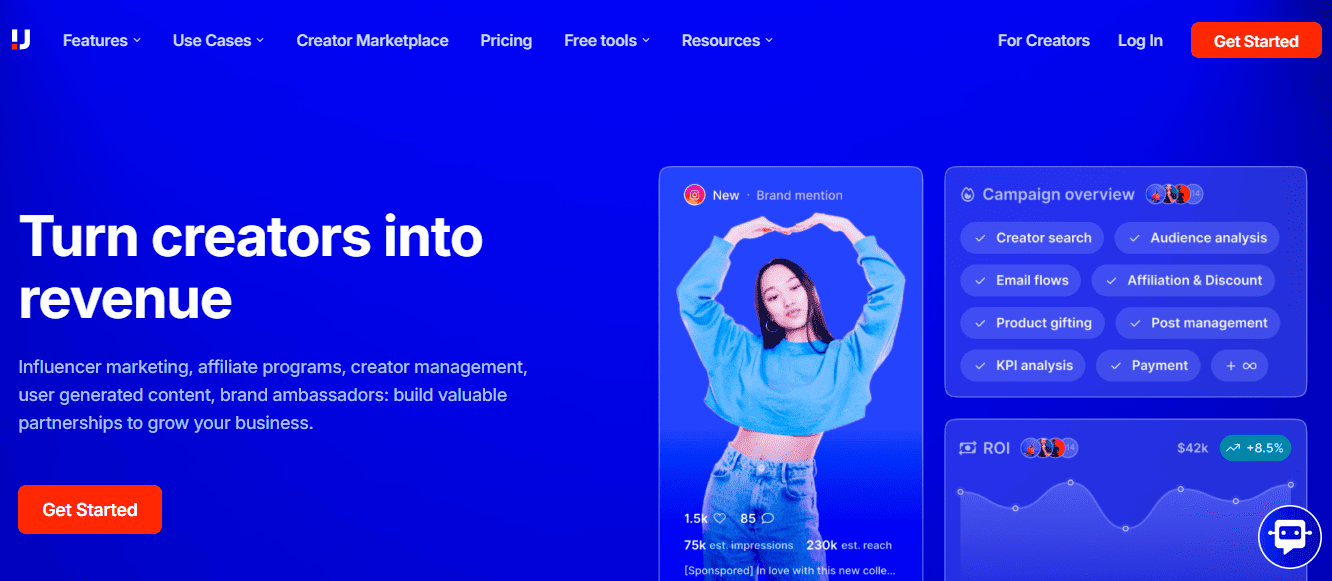
Best For: Best suited for eCommerce-focused brands, particularly those selling on Shopify or Amazon, that want to connect influencer activity directly to revenue. Ideal for businesses seeking a full-suite influencer management platform with affiliate tracking and ROI measurement at the core.
Pricing: Custom pricing with yearly commitments, starting around $2,000/month ($24,000 annually). Optional payment processing tool costs $399/month but can be disabled if not needed (e.g., for gifting-only campaigns). Discounts may apply for upfront annual payments.
Reviews: 4.3 / 5.0 (Capterra)
Upfluence Standout Features:
- AI Discovery & Outreach: 12M+ influencer database with Jace AI to power automated drip flows and personalized messaging.
- Shopify & Customer Matching: Detects existing customers who are influencers and enables gifting, affiliate code creation, and commission tracking.
- Amazon Integration: Links influencer campaigns directly to affiliate sales and conversion data for Amazon sellers.
- Social Listening: Research trending content and monitor which posts perform best in terms of engagement.
- Comprehensive CRM: Centralizes communications, affiliate links, and campaign tracking.
- Bulk Payout System: Securely manages mass influencer payments.
- Flat Fee Pricing: Subscription-based with no extra commission fees tied to sales or outreach scale.
Upfluence Pros and Cons
Our Insights
Upfluence shines for established eCommerce brands that want to prove ROI by tying influencer efforts directly to Shopify and Amazon sales. Its customer-matching tool is especially valuable, helping brands turn loyal buyers into authentic advocates, while the flat-fee model avoids commission cuts on influencer-driven revenue. That said, the high cost and annual contract make it better suited for larger teams with the budget and bandwidth to leverage its full feature set.
4. Heepsy

Best For: Instagram, TikTok, YouTube, and Facebook.
Pricing:
- Free
- Starter: $69/month
- Plus: $199/month
- Advanced: $299/month
Reviews: 4.5 / 5.0 (Capterra)
Heepsy Standout Features:
- Advanced Influencer Discovery: Filter by keywords, follower size, engagement rate, and audience demographics.
- Fake Follower Detection: Authenticity filter with ~85% accuracy to ensure influencer quality.
- CRM & Outreach Automation: Bulk outreach up to 3,000 emails/month, with customizable templates and a Kanban-style pipeline.
- Integrated eCommerce Support: Works seamlessly with Shopify and WooCommerce to track affiliate sales, clicks, and conversions.
- Shopify Discount Code & Link Generation: Automatically create and assign codes to influencers, making ROI tracking straightforward.
- Automated Media Monitoring: Detect and collect influencer content using hashtags and mentions for campaign reporting.
- Lookalike Influencer Search: Identify creators similar to top performers for scaling campaigns quickly.
Heepsy Pros and Cons
Our Insights
Heepsy is a strong choice for small to mid-sized Shopify brands that want an affordable and scalable influencer marketing solution with sales attribution built in. The Advanced plan unlocks the most value with Shopify integration, bulk outreach, and automated tracking—making it ideal for brands running affiliate or commission-based campaigns. While the Plus plan is useful for discovery and engagement reporting, serious eCommerce teams will benefit from the Advanced plan to connect influencer activity directly to sales performance.
5. The Cirqle
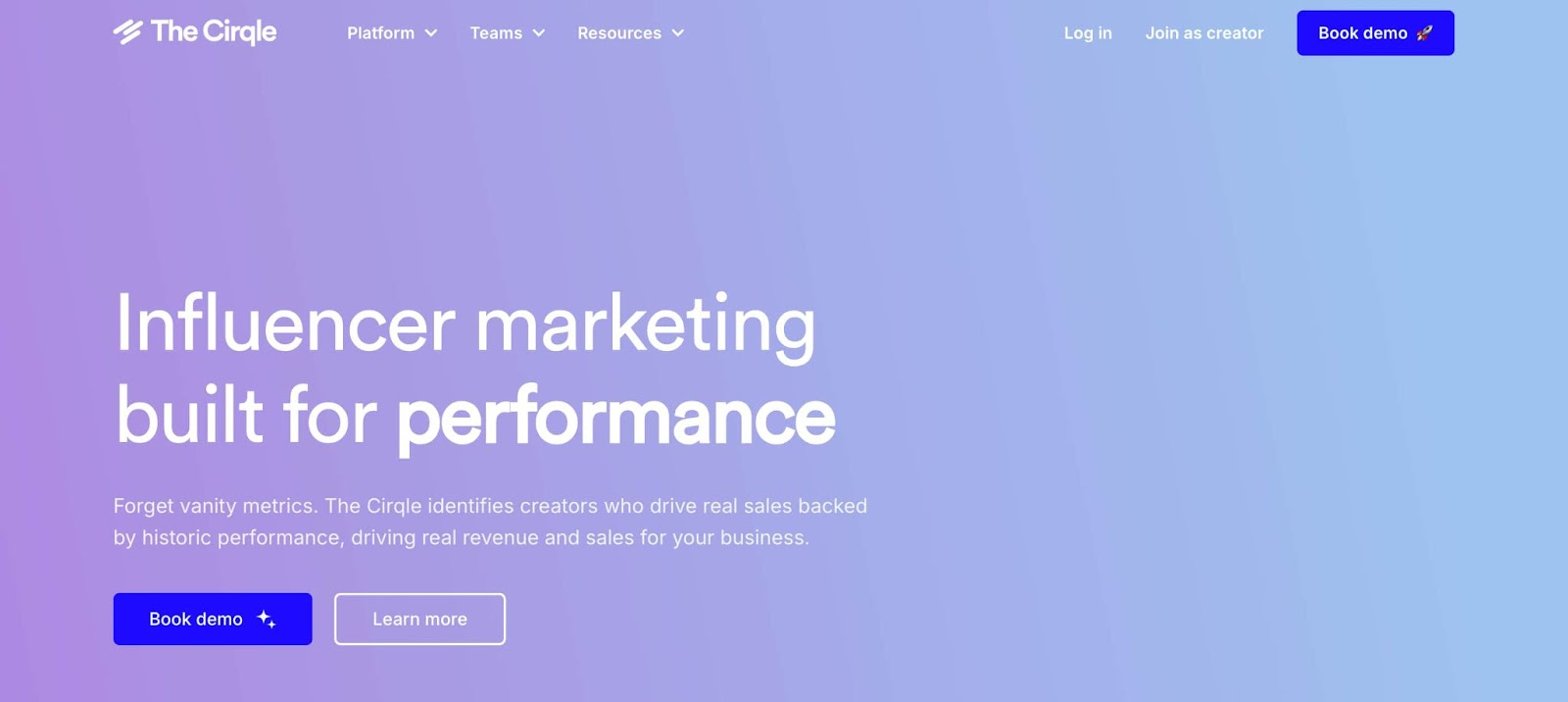
Best For: Medium to large-scale brands seeking AI-driven campaign automation, predictive ROI insights, and streamlined cross-channel management. Particularly effective for Shopify businesses looking to directly connect influencer initiatives to sales.
Pricing:
- Launch: €1,000/month
- Grow: €2,000/month
- Scale: €4,000/month
- Enterprise: Custom pricing
Reviews: 4.2 / 5.0 (G2)
The Cirqle Standout Features:
- Shopify Sync: Directly link campaigns to your Shopify store to track conversions and revenue. This integration proves ROI by connecting influencer activity with actual sales outcomes.
- AI Brief Creation: Instantly generate campaign briefs using data-backed templates that adapt to your brand goals. This reduces manual work and ensures every brief is consistent and strategic.
- Built-In Rate Negotiation: The platform streamlines pricing discussions between brands and influencers. By keeping negotiations in one place, it shortens timelines and prevents miscommunication.
- Workflow Automation: From contracts to payments, logistics, and reporting, The Cirqle automates repetitive tasks. This allows brands to focus on strategy and creative execution instead of admin work.
- Predictive ROI Analysis: Before collaborating, brands can review creators’ historical return on ad spend. This feature minimizes risk and helps allocate budget to influencers who drive measurable results.
- Verified Influencer Pool: The Cirqle provides access to over 1M vetted influencer profiles. Each comes with advanced audience analytics, ensuring partnerships are authentic and data-driven.
- Ad Manager Integration: With one click, influencer content can be turned into paid ads. This extends campaign reach and allows brands to amplify top-performing posts across channels.
The Cirqle Pros and Cons
Our Insights
The Cirqle is particularly strong for medium to large Shopify brands that want influencer marketing tightly connected to sales performance. Its Shopify Sync is a major advantage, letting teams attribute revenue directly to creator content, something many influencer platforms still struggle to do natively. Combined with predictive ROI tools, brands can make smarter investment decisions before committing budgets. It stands out for bridging influencer marketing with eCommerce performance tracking and paid media amplification, making it a solid choice for Shopify-focused businesses ready to scale.
6. Refersion
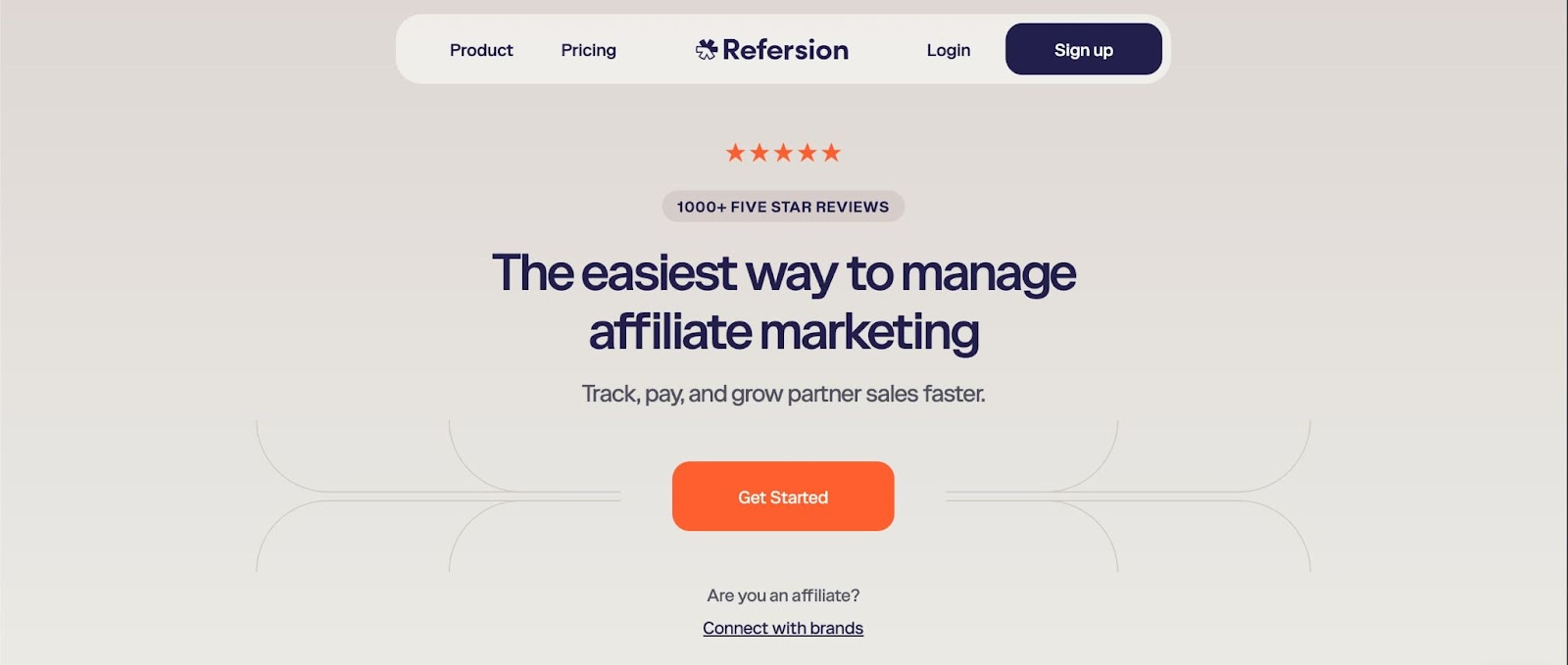
Best For: eCommerce brands on Shopify (and similar platforms) that want to build, manage, and scale affiliate and influencer programs with solid tracking, commission flexibility, and partner payout options. It works well for those who want to convert customers, ambassadors, and influencers into affiliate partners and need accurate sales attribution.
Pricing:
- Launch: $39/month
- Growth: $129/month
- Scale: $599/month
Reviews: 4.7 / 5.0 (Shopify App Store)
Refersion Standout Features:
- Flexible Commission Structures: Allows you to use percent of sale, flat rate (per order or item), or tiered commissions, including product/SKU-level commissions.
- Affiliate Experience Dashboard: Affiliates get their own dashboard where they can monitor clicks, conversions, commissions, payouts etc., in real time.
- Offer Tracking via Multiple Channels: You can track affiliate performance via links, coupon codes, email, SKUs. This gives flexibility in how referrals are structured and attributed.
- Shopify-Product Feed Automation & Integration: For Shopify users, Refersion offers automated product feed support so SKUs/products are synced and commission rules can be product-level, making setup easier.
- Marketplace Discovery: Affiliates can discover merchants via the Refersion Marketplace; merchants get free listing in marketplace.
- API & Webhooks Access: For advanced users or large programs, access to APIs/webhooks allows custom integrations, automations, custom reporting or affiliate payout flows.
- Multi-Store / Multi-Currency / Scaling Support: Higher tier plans allow merchants to manage multiple stores, support for multi-currency, specialized commission rules (e.g. different commissions for new vs returning customers) etc.
Refersion Pros and Cons
Our Insights
Refersion is a solid choice for Shopify brands that want robust affiliate-/influencer-partner tracking with flexible commission rules and strong attribution. For businesses with moderate volume (50-200 conversions/month) moving toward scaling, Refersion’s Business or Scale-level plans offer the tools to manage more affiliates, multiple stores, and deeper reporting.
If your brand is small and just starting, the Professional plan might cover the essentials (affiliate codes, links, basic SKUs, coupons). But to unlock the differentiators you’ll likely need to invest in a higher tier.
Also, be mindful of cost vs ROI: as affiliate revenue grows, the percentage or flat-fees can add up, and you’ll want to ensure the tracking & commission logic is well configured to avoid overpaying affiliates (especially under special subscription or proration use cases, which some users have flagged).
7. Modash
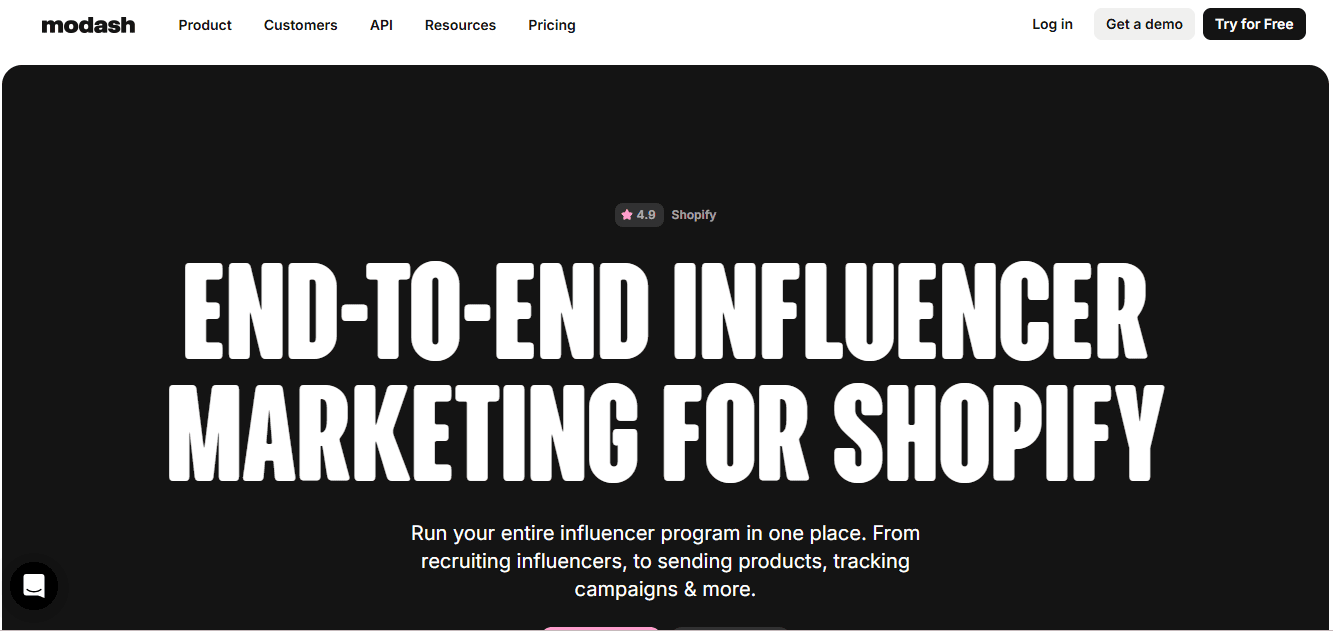
Best For: Brands aiming to expand their influencer efforts globally while leveraging advanced audience analytics and campaign performance tracking. Especially useful for Shopify-driven eCommerce teams.
Pricing: Offers 14-day free trials for both Essentials and Performance plans.
- Essentials: $299/month
- Performance: $299/month
- Enterprise: Custom pricing
Reviews: 4.9 / 5.0 (Capterra)
Modash Standout Features:
- Global Influencer Database: Access to 350M+ public influencer profiles, enabling international reach and niche targeting.
- Branded Content Monitoring: Collects UGC through brand mentions and hashtags, though usage rights must be managed separately.
- Shopify-Centered Affiliate System: Handles gifting, discount codes, sales tracking, and payments within Shopify stores.
- Fan Discovery: Surfaces influencers already engaging with the brand to drive authentic partnerships.
- Smart Matching: AI-powered recommendations using keywords or image-based searches.
- Live Campaign Analytics: Real-time performance data to adjust strategies instantly.
Modash Pros and Cons
Our Insights
Modash is a strong choice for Shopify brands looking to scale influencer campaigns internationally while maintaining data-driven control. Its massive global database, AI-powered matching, and “Find Your Fans” feature make it easy to identify authentic creators who already engage with your brand, and Shopify-centered affiliate tools streamline tracking and payments. While it lacks broader eCommerce integrations and ad management, it excels at analytics, audience insights, and scalable campaign execution.
8. GRIN

Best For: Tailored for DTC and eCommerce brands that need to oversee every stage of influencer campaigns, seeding, gifting, UGC, affiliate management, and ROI tracking, from one centralized hub. Especially beneficial for brands using Shopify, WooCommerce, or Magento to connect influencer activity directly with sales performance.
Pricing: Plans begin at $25,000 annually, with monthly payments available (approx. $2,500–$10,000+ depending on scale). Requires a 12-month contract, with pricing flexibility depending on selected features.
Reviews: 4.5 / 5.0 (G2)
GRIN Standout Features:
- Gia (GRIN Intelligent Assistant): AI assistant that helps discover and qualify creators, optimize campaigns, and surface insights.
- Unlimited Influencer Management: No cap on the number of influencer relationships brands can run simultaneously.
- Native eCommerce Infrastructure: Integrates with Shopify, WooCommerce, Magento, and Salesforce Commerce for automated gifting, discount codes, and ROI tracking.
- Customer-Led Discovery: Finds influencers already within a brand’s customer base to activate authentic advocacy.
- Creator Portals: Streamlined dashboards for influencers with briefs, contracts, codes, and payment visibility.
- Advanced UGC Library: Centralizes all creator content with automatic rights management for easy repurposing.
- Social Listening + Affiliate Hub: Monitors mentions, hashtags, and manages commissions in one space.
GRIN Pros and Cons
Our Insights
GRIN is ideal for Shopify and DTC brands that want to centralize every aspect of influencer marketing, from discovery and gifting to affiliate tracking and UGC management. Its AI assistant, unlimited influencer management, and native eCommerce integrations make it easy to connect campaigns directly to sales while streamlining workflow. Though the platform comes with a higher cost and annual contract, it excels for brands ready to scale comprehensive influencer programs with full visibility and control.
9. Afluencer
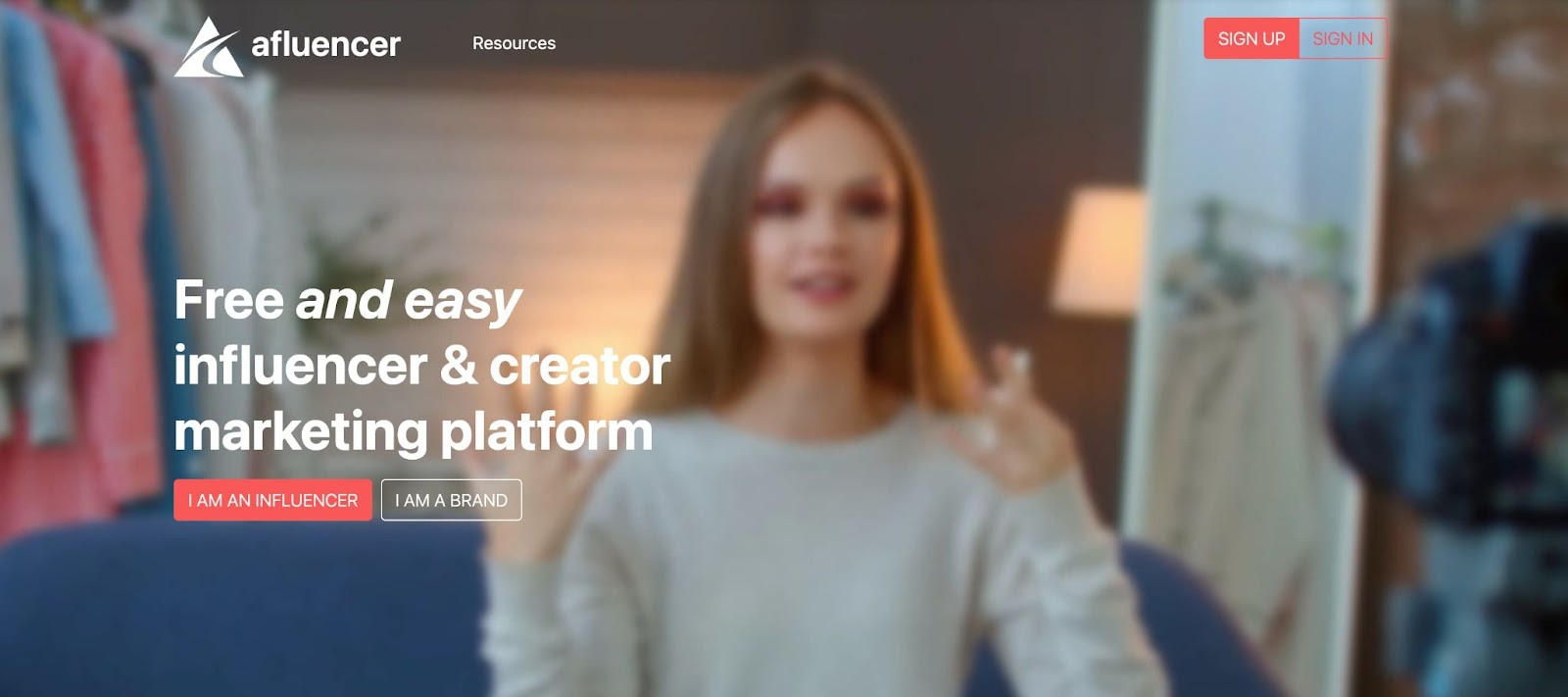
Best For: Small to mid-sized e-commerce brands, particularly Shopify merchants, looking for a budget-friendly way to connect with influencers, manage collaborations, and scale ambassador programs without the heavy costs of enterprise platforms.
Pricing:
- VIP: $49/month
- Concierge: $99/month
- Boss: $199/month
Reviews: 4.8 / 5.0 (Shopify App Store)
Afluencer Standout Features:
- Shopify Integration & Product Gifting: Easily connect your Shopify store to streamline product seeding, affiliate tracking, and discount code creation for influencers.
- Influencer Marketplace Access: Browse and connect with thousands of pre-vetted micro and nano influencers actively seeking brand deals.
- Collaboration Management Dashboard: Manage outreach, content approvals, and communication within one interface.
- Affordable Discovery Tools: Use filters like niche, follower count, and engagement rate to find influencers without enterprise-level complexity.
- Content Tracking & ROI Monitoring: Track campaign progress with built-in reporting on influencer reach, engagement, and conversions.
- Ambassador Program Support: Ideal for building long-term influencer and ambassador partnerships, especially for smaller Shopify stores.
Afluencer Pros and Cons
Our Insights
Afluencer is a strong option for Shopify brands that want to launch or scale influencer programs without the steep investment of enterprise solutions. Its marketplace model makes it easy to connect with creators who are ready to collaborate, while Shopify integration streamlines gifting and affiliate tracking. Although it lacks the deep data analytics, fraud detection, and AI-driven recommendations of higher-end platforms, it’s an excellent choice for budget-conscious teams that prioritize affordability, simplicity, and direct connections with micro-influencers.
10. UpPromote
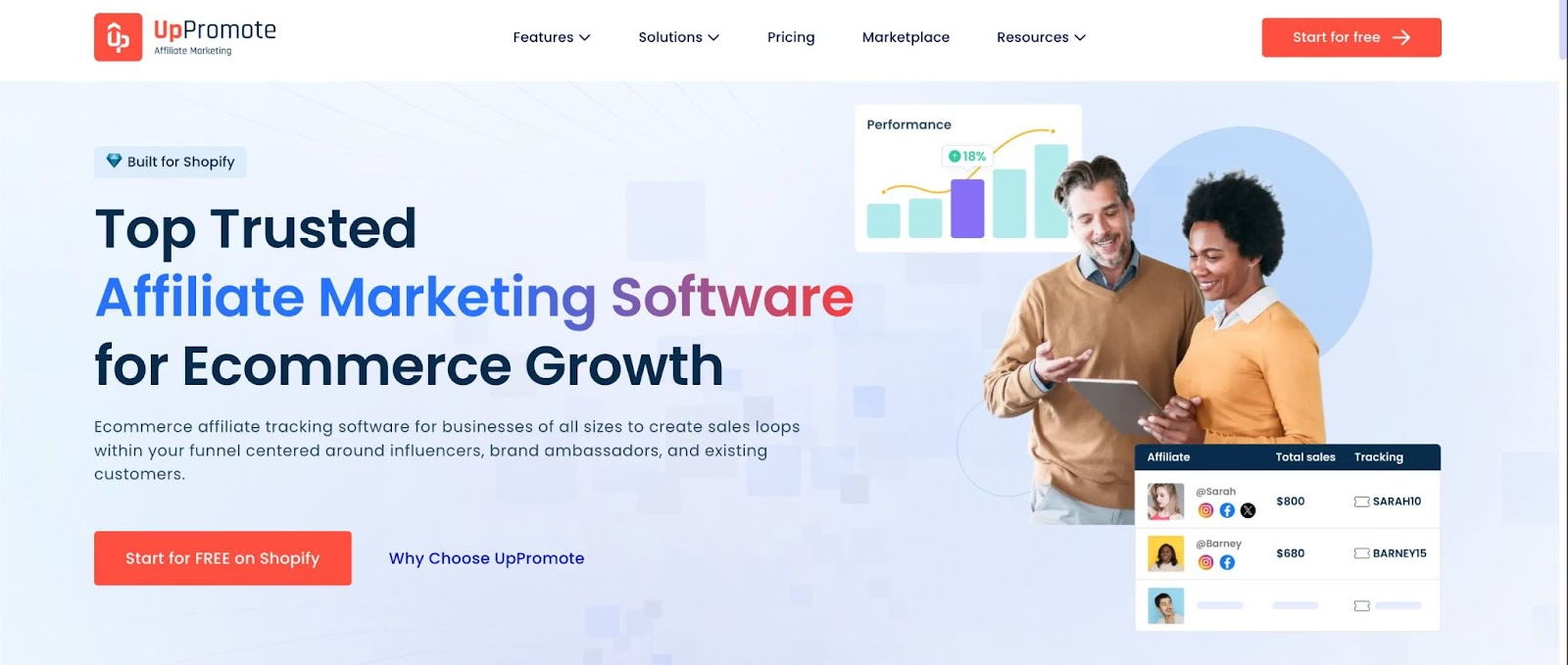
Best For: Shopify / eCommerce brands of small to medium size that want a flexible, robust affiliate + referral + influencer tool that scales as their affiliate program grows. It works well for brands that want customizable commission structures, good automation, and efficient payout workflows.
Pricing: All UpPromote plans offer a 14-day free trial.
- Free Plan
- Growth: $29.99
- Professional: $89.99
- Enterprise: $199.99
Reviews: 4.9 / 5.0 (Shopify App Store)
UpPromote Standout Features:
- Flexible Commission & MLM Structures: Support for multi-level marketing, lifetime commissions, special product or collection commissions, auto-tiered commissions depending on order value.
- Customer Referral Widget & Post-Purchase Signup: You can turn customers into referrers via a post-purchase popup; offer rewards to both referrer & referred friend; design and customize referral widgets and landing pages.
- Auto-Payout & Discount / Coupon Automation: Features such as auto-generate coupons, auto-discount application, and auto-payout via PayPal in higher plans to reduce manual payment work.
- Built for Shopify Integration: Fully embedded in Shopify’s admin UI; good compatibility with Shopify themes; works directly with Shopify data.
- Real-Time Analytics & Reporting: Dashboard with click/referral/sales data; top affiliate boards; ability to review referral orders; media/assets space; filtering by date etc.
- Affiliate / Marketplace Discovery + Custom Registration Forms: Marketplace listing to attract affiliates, customizable affiliate signup/registration templates, registration forms that match branding, multiple programs support.
- Fraud Detection & Reliable Tracking: Tools to detect spam/referrals or self-referrals; review referrals before approving; limits on referral review volumes etc. Ensures more trust in affiliate data.
UpPromote Pros and Cons
Our Insights
UpPromote is one of the top contenders for Shopify brands that want a robust affiliate/referral program without paying super high fees up front. Its performance-fee + subscription model means your cost scales with revenue, which can reduce risk early on. The Free or Growth tiers are good for testing and smaller scale operations; the Professional and Enterprise plans unlock automation, high limits, and more powerful attribution, which become critical once your affiliate program grows.
Final Thoughts
The best influencer software for Shopify depends on a brand’s size, goals, and budget. Tools like Shopify Collabs, UpPromote, and Modash are ideal for smaller brands seeking simplicity and affordability, while platforms such as GRIN and NeoReach cater to enterprises with advanced analytics, global reach, and full campaign management. Each solution offers unique strengths, from AI-powered discovery to affiliate tracking and seamless gifting, giving Shopify merchants a wide range of options.
Among these, Influencer Hero stands out as one of the best alternatives thanks to its AI-driven CRM, direct Shopify integration, and scalable outreach tools. By connecting influencer discovery, gifting, and ROI tracking in one platform, it helps brands save time while driving measurable sales. With flexible pricing and strong support, Influencer Hero is a powerful choice for eCommerce teams looking to scale their influencer marketing efficiently.



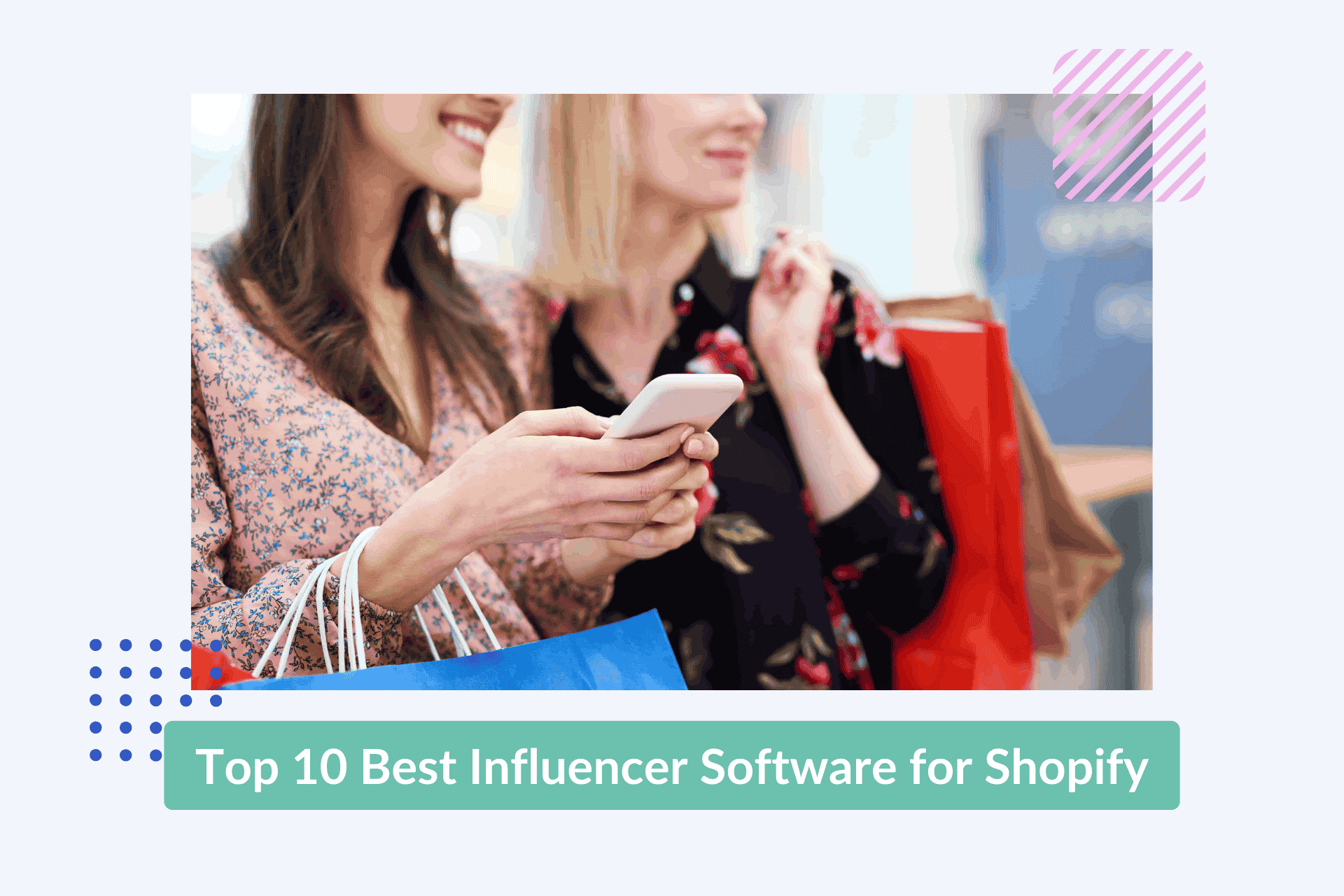

.svg)

%201.png)












_logo.svg.png)








